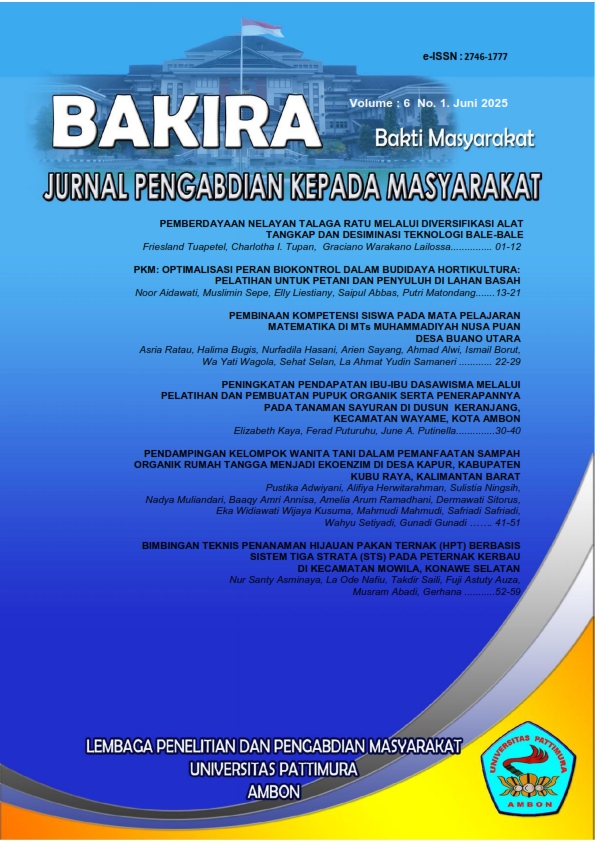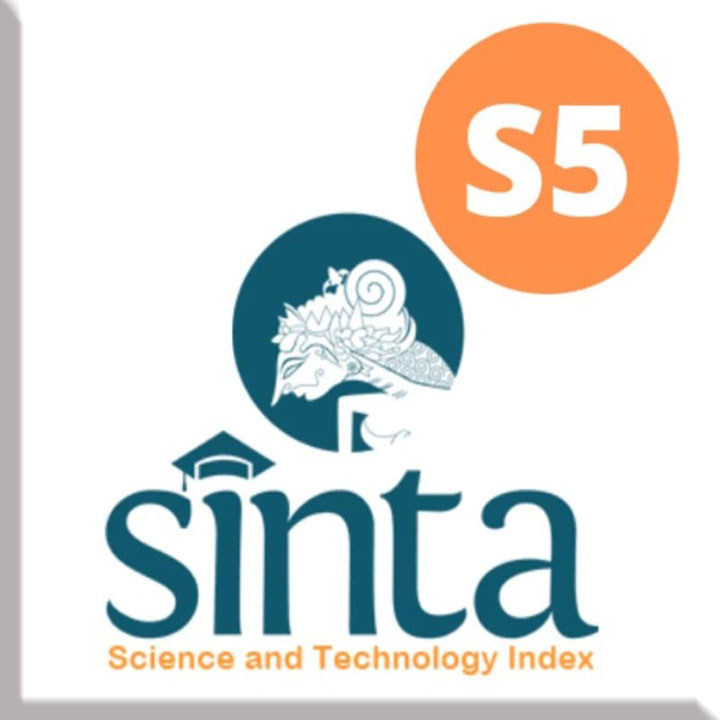SOSIALISASI PENERAPAN COMMUNITY BASED ECOUTOURISM DALAM MENDUKUNG PENGEMBANGAN OBJEK AGROWISATA DI NEGERI SOYA
Abstract
The community service activity was carried out as an effort to enhance understanding of the development of the 3A components in supporting the potential of dusung as an agrotourism attraction in Negeri Soya. The understanding and involvement of dusung owners and the local government play a crucial role in supporting the future development of this tourism asset. This community service activity aimed to increase the interest and understanding of dusung landowners and village officials in Soya Village in developing the natural resource potential within the dusung area as a Community-based ecotourism (CBE) agro-tourism destination. The methods used included socialization sessions, focus group discussions, and field observations. The activity was carried out over the course of one week and involved local community members and village authorities as participants in the community engagement program. The results showed a significant improvement in participants' understanding of the concepts of agro-tourism, the 3A components (Attraction, Accessibility, Amenities), CBE principles, and the impacts of tourism development. Pre-test and post-test results indicated an increase in comprehension, with approximately 90–98% improvement across all questions following the program's implementation.
Downloads
References
Chotimah, U., Faisal, E. E., Camellia, C., Sulkipani, S., & Mariyani, M. 2021. Penyuluhan dan Pelatihan Penyusunan Rencana Pelaksanaan Pembelajaran Satu Lembar Bagi Guru Sekolah Menengah Pertama. Jurnal Pengabdian Kepada Masyarakat, 1(1), 26–31. https://doi.org/10.56393/jpkm.v1i1.1393.
Departemen Kehutanan Republik Indonesia. 2003. Pedoman Penilaian Kelayakan Objek dan Daya Tarik Wisata Alam (ODTWA). Jakarta: Ditjen PHKA.
Dewi, R. S., Lestari, R. Y., & Nida, Q. 2021. Inovasi Pengolahan Buah Pisang Sebagai Bentuk Pemberdayaan Masyarakat Dalam Mewujudkan Ketahanan Pangan Masyarakat. Jurnal Pengabdian Kepada Masyarakat, 1(2), 44–47. https://doi.org/10.56393/jpkm.v1i2.450.
Giampiccoli, A., & Mtapuri, O. 2012. Community-based tourism: An exploration of the concept(s). Acta Commercii, 12(1), 1–9. https://doi.org/10.4102/ac.v12i1.182.
Gunawan, H., Purnomo, S. H., & Marfai, M. A. 2020. Evaluating the potential of sustainable tourism in volcanic mountain areas: A case study of Merapi, Indonesia. Sustainability, 12(6), 2518. https://doi.org/10.3390/su12062518.
Hilmi, M. I. 2022. Modul Konsep Pendidikan Masyarakat. Program Studi Pendidikan Luar Sekolah – Skripsi. Jurusan Ilmu Pendidikan Fakultas Keguruan Dan Ilmu Pendidikan. Universitas Jember.
Honey, M. 2008. Ecotourism and Sustainable Development: Who Owns Paradise? (2nd ed.). Washington: Island Press.
Juwandi, R., Lestari, R. Y., & Nida, Q. 2021. Pemberdayaan Ekonomi Kreatif Dan Ketahanan Pangan Masyarakat Dalam Optimalisasi Singkong Sebagai Penguatan Economic Civic. Jurnal Pengabdian Kepada Masyarakat, 1(1), 7–12. https://doi.org/10.56393/jpkm.v1i1.451.
Lestari, N. W., & Pramudito, H. 2020. Strategi Edukasi Lingkungan Melalui Pendekatan Partisipatif di Daerah Rawan Ekowisata. Jurnal Abdi Masyarakat, 5(2), 44–50.
Leksmono, C., Suwarno, T., & Indrawan, M. 2020. Strategi Pengembangan Ekowisata Berbasis Masyarakat di Kawasan Perdesaan. Jurnal Perencanaan Wilayah dan Kota, 31(1), 45–56. https://doi.org/10.5614.jpwk.2020.31.1.4
Ngajow, M. F., Roring, F., & Pontoh, G. D. 2021. Strategi pengembangan ekowisata berbasis masyarakat dalam meningkatkan daya tarik destinasi. Jurnal Ilmu Sosial dan Humaniora, 10(2), 150–160. https://doi.org/10.xxxx/jish.v10i2.xxxx.
Nurdiyanah, Wahyudi, J. & Wahid, M. 2022. Metodologi Pengabdian Masyarakat. Direktorat Pendidikan Tinggi Keagamaan Islam Direktorat Jenderal Pendidikan Islam Kementerian Agama RI.
Sari, D. N., Wibowo, A., & Widodo, A. 2021. Peningkatan Pemahaman Konservasi Melalui Kegiatan Sosialisasi dan Pelatihan pada Masyarakat Desa Wisata. Jurnal Pengabdian Kepada Masyarakat, 7(1), 25–32.
Saarinen, J. 2006. Traditions of sustainability in tourism studies. Annals of Tourism Research, 33(4), 1121–1140. https://doi.org/10.1016/j.annals.2006.06.007.
Scheyvens, R. 1999. Ecotourism and the empowerment of local communities. Tourism Management, 20(2), 245–249. https://doi.org/10.1016/S0261-5177(98)00069-7.
Suansri, P. 2003. Community-Based Tourism Handbook. Bangkok: Responsible Ecological Social Tours (REST).
Manyara, G., & Jones, E. 2007. Community-based tourism enterprises development in Kenya:An exploration of their potential as avenues of poverty reduction. Journal of Sustainable Tourism, 15(6), 628–644. https://doi.org/10.2167/jost723.0.
Scheyvens, R. 1999. Ecotourism and the empowerment of local communities. Tourism Management, 20(2), 245–249. https://doi.org/10.1016/S0261-5177(98)00069-7.
Copyright (c) 2025 Yosevita Th. Latupapua, Andri Tuhumuri, Yerri Latupeirissa

This work is licensed under a Creative Commons Attribution-NonCommercial-ShareAlike 4.0 International License.













